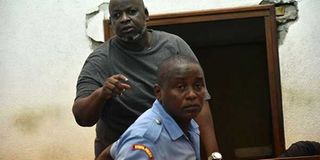State goes after property of Mombasa man branded new ‘drug kingpin’

Swaleh Yusuf Ahmed who was charged with trafficking heroin valued at Sh275 million when he appeared in court in Mombasa in January 2019. Mombasa has remained a hotbed of drug trafficking especially by foreigners. PHOTO | FILE | NATION MEDIA GROUP
The state has turned its guns on the property of Mombasa businessman Yusuf Ahmed Swaleh after he was acquitted of a drug trafficking charge by a Mombasa court.
Mr Swaleh, who has been convicted of money laundering, has for years been on the government’s radar over drug related offences.
The property includes at least three high end vehicles, which the state alleges were bought using proceeds of crime.
“The motor vehicles are reasonably believed to have been purchased with proceeds of crime namely trafficking in narcotic drugs and money laundering offenses,” the state said in a court document.
The state says that three of the vehicles are registered in the name of Asma Abdalla Mohamed, who is Mr Swaleh’s wife.
Senior Prosecution Counsel Jami Yamina told Shanzu court that the state will be seeking a forfeiture of property worth millions of shilling, including money and vehicles, which it believed were proceeds of crime.
Mr Swaleh and Ms Mohamed have already been convicted of the offence of money laundering and are awaiting sentencing.
They were charged that on February 4, 2017, they engaged in an agreement for purchase of four motor vehicles at a cost of Sh7.6 million, while knowing that the money was the proceeds of crime, namely trafficking in narcotic drugs, whose effect was to conceal the source of the said money.
The court records show that the convict purchased two vehicles within two months and paid Sh6.2 million.
“No legitimate source of funds for these huge cash transactions without which there are reasonable grounds to believe that it is ill gotten money from criminal activities,” the court heard.
The court however convicted them of the offence of money laundering after finding that they had no legal business to support the millions that they had deposited in their accounts, and used to buy the four vehicles.
Former Shanzu Chief Magistrate Florence Macharia noted that though the couple had been acquitted of the offence of trafficking in drugs, they had a duty to show how the money used to purchase the vehicles was realized.
Documents tabled in court show that from bank statements of the couple, their maximum monthly income from the account opening forms was Sh10,000.
But the charge sheet reads that a whooping Sh3.1 million was paid on February 4, 2013 for the purchase of motor vehicle KBU 577X.
The prosecution then submitted that the money used to purchase this vehicle was a proceeds of crime hence the vehicle suffered the same defects as the funds.
“The prosecution managed to demonstrate that the couple did not have a known source of funds to raise the amount in issue at once. Though Mr Swaleh indicated that he was running a chicken business and also selling water, no evidence to back the alleged business was tabled,” the magistrate said.
In less than two months again, the court records show that the couple purchased another vehicle and paid in full Sh3.1 million.
The magistrate observed that it was upon the couple to demonstrate how a whooping Sh6.3million could be raised in slightly over two months without any documentation provided to support such a transaction.
“If indeed there was any business carried out by the accused persons to justify a sum of over Sh6 million in just two months, at least there would be invoices, cheques or receipts justifying such proceeds. This was never done. To this end, I do find that the prosecution discharged their evidential burden to warrant the accused persons to give a rebuttal,” said the magistrate.
The magistrate noted that though the burden of proof always rests with the prosecution, to prove its case against the accused persons beyond reasonable doubt, there are instances when the law places a duty on the accused to explain certain facts particularly those peculiarly within their knowledge.
The court noted that once the prosecution had discharged the burden showing that the funds used in the purchase of the vehicles were proceeds of crime, it behooved the accused persons to demonstrate how the funds were acquired.
“In their defence, the accused simply denied the charges but never showed how the funds were acquired. An acquittal on the charges of trafficking in drugs does not in any event affect the offences of money laundering,” said the magistrate.
The court concluded that the state had proved the offence of money laundering beyond reasonable doubt and convicted the couple.
In the same case, the couple were charged alongside Masuo Bakari Tajiri with several counts of trafficking in heroin worth Sh47 million and money laundering.
They were accused of trafficking in 16,843 grams of heroin worth over Sh47 million.
However, the couple were acquitted on this charge with the court observing that the house where the substance was recovered did not belong to Swaleh and his wife, and that the owner of the house was not charged.
The court noted that the state failed to demonstrate the connection between the couple and the drugs terming the evidence adduced over the same as hearsay and, therefore, inadmissible.
Mr Bakari however died before their trial could be concluded. His mutilated body was discovered in a thicket in Thika last year a month after he was reported missing on December 3, 2021.





